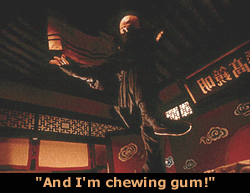***½/****
starring Yu Rong Guang, Donnie Yen, Jean Wang, Tsang Sze Man
screenplay by Tsui Hark, Elsa Tang, Lau Tai Mok
directed by Yuen Wo Ping
 by Walter Chaw I first saw Yuen Woo-ping’s Iron Monkey on what must have been a third-generation bootleg: it was in unsubtitled Cantonese and fullscreen pan-and-scan, brought home unlabeled on a cheap Maxell videotape from a Vietnamese grocery down on South Federal. As a native Mandarin speaker, I didn’t understand a word of it, and the quality of the tape was such that it was impossible to decipher any shadow detail, but it was clear to me even then that Iron Monkey was something extremely special. Long a cult favourite in the United States (although it didn’t do particularly well when released theatrically in Asia), Iron Monkey received an extremely nice DVD transfer in 1998 from Media Asia; it is a disc that holds a place of honour in my personal collection. With the massive popularity of The Matrix and Crouching Tiger, Hidden Dragon (both choreographed by Woo-ping), as well as the surprising success of Americanized re-issues of Jackie Chan’s old Hong Kong films, Iron Monkey has been cleaned up, freshly subtitled, and booked in American moviehouses in an attempt to capitalize on the sudden popularity of wire-fu in particular and the dizzying HK cinema in general.
by Walter Chaw I first saw Yuen Woo-ping’s Iron Monkey on what must have been a third-generation bootleg: it was in unsubtitled Cantonese and fullscreen pan-and-scan, brought home unlabeled on a cheap Maxell videotape from a Vietnamese grocery down on South Federal. As a native Mandarin speaker, I didn’t understand a word of it, and the quality of the tape was such that it was impossible to decipher any shadow detail, but it was clear to me even then that Iron Monkey was something extremely special. Long a cult favourite in the United States (although it didn’t do particularly well when released theatrically in Asia), Iron Monkey received an extremely nice DVD transfer in 1998 from Media Asia; it is a disc that holds a place of honour in my personal collection. With the massive popularity of The Matrix and Crouching Tiger, Hidden Dragon (both choreographed by Woo-ping), as well as the surprising success of Americanized re-issues of Jackie Chan’s old Hong Kong films, Iron Monkey has been cleaned up, freshly subtitled, and booked in American moviehouses in an attempt to capitalize on the sudden popularity of wire-fu in particular and the dizzying HK cinema in general.
Dr. Yang (Yu Rongguang) treats a small Chinese village struggling with the Emperor’s tax collectors, fallen Shaolin monks turned to banditry, and their own corrupt governor (James Wong), who is more interested in his nine wives and stolen fortunes than in the welfare of his people. By night, Dr. Yang dons ninja-like garb and the name “Iron Monkey” to rob from the rich and give to the poor. Comparisons to Robin Hood are altogether appropriate, though the only “merry man” that Iron Monkey boasts of is his lovely assistant Ms. Orchid (Jean Wang). Desperate to stop the benevolent robber before he redistributes his wealth, the governor orders visiting martial artist Wong Kei-Ying (Donnie Yen) to arrest the Iron Monkey, lest Kei-Ying’s son, Fei-Hung (Tsang Sze-Man, who is actually a young woman) spend the rest of his life in prison. The two (Wong Kei-Ying and the Iron Monkey) soon discover, however, that their common enemy is the unjust economy and system of governance, embodied by the fearsome Monk (Yam Sai-Kung) and his henchmen, under which they both toil.
Conceptualized and overseen by legendary HK producer Tsui Hark, Siunin Wong Fei-hung tsi titmalau–“Young Wong Fei-hung: Iron Monkey”–was released in 1993, sandwiched between the first three instalments of Hark’s Once Upon a Time In China (each of which starred Jet Li), and the last three, which did not. It works as a prequel in Hark’s Wong Fei-Hung saga, a Once Upon a Time in China: Episode One, if you will, introducing the legendary Chinese healer, spiritual leader, and umbrella-wielding martial artist as a young child on the arm of his father. The story of Wong Fei-Hung is as familiar to Chinese audiences as Dave Crockett once was to American audiences; with over one-hundred films dedicated to Fei-Hung alone in the last thirty-some years (Jackie Chan played Fei-Hung in two Drunken Master films), there is very little character development and background provided when Fei-Hung and his father saunter into Iron Monkey–but be aware that the Chinese would recognize the fate of this child as the film’s most vital element.
Looking sharp, sounding fantastic, and with humour that is surprisingly accessible to a Western audience, Iron Monkey is not as lyrical as Crouching Tiger, nor as grim as The Matrix, but it has more action sequences and joy than either. Fans of those two later films will be interested to note in Iron Monkey (as well as a few of Woo-ping’s other films, especially Buddha Fist and Drunken Fist) early versions of familiar fight motions. While it has moments of alarming violence (a throat-slashing and some eye trauma chief among them), Iron Monkey is never particularly graphic and first and foremost interested in the balletic choreography of a very particular kind of wire-assisted fight sequence that, if not invented by Woo-ping and his almost equally famous brothers, has certainly been perfected by them. From a dazzling conclusion balanced atop flaming wooden poles to more subtle moments, including a liltingly graceful gathering of windblown papers, Iron Monkey is largely flash over substance, and the flash is so extraordinary that it forgives narrative lightness and invites a Western audience to glimpse the source material for many of its most popular modern entertainments.


![The Killer/Hard-Boiled [Blu-ray Double Feature] - Blu-ray Disc 241059964_80_80-2942937](https://filmfreakcentral.net/wp-content/uploads/2011/01/241059964_80_80-2942937.jpg)

